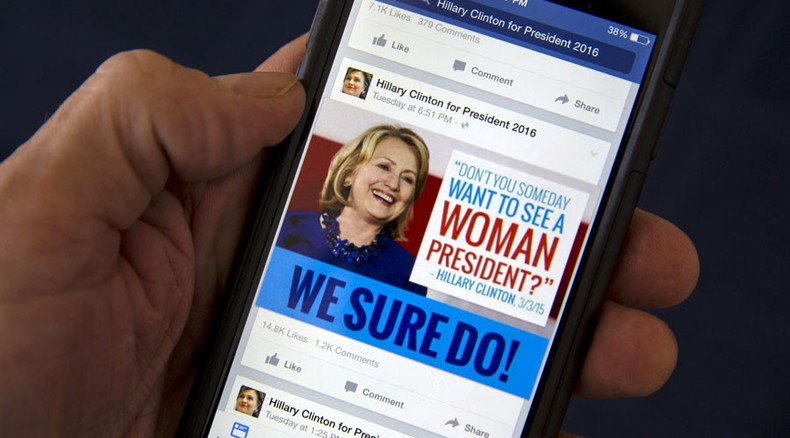Feds can’t tweet that: New rules limit political posts for gov’t workers

The rules barring federal employees from engaging in political activities at work have received a 21st-century facelift for the 2016 election cycle. The new regulations cover how government workers can ‒ and can’t ‒ get political on social media.
“Social media and email — and the ease of accessing those accounts at work, either on computers or smartphones — have made it easier for federal employees to violate the Hatch Act. Yet there are many activities employees can do on social media and email that do not violate the law,” the guide issued by the Office of Special Counsel, an independent federal investigative and prosecutorial agency in charge of enforcing that law, said.
The Hatch Act of 1939 specifically prohibits most executive branch employees “from engaging in political activity while on duty or in the Federal workplace,” including soliciting and receiving political contributions.
“We’re in a world where social media is everywhere,” Nick Schwellenbach, spokesman for the Office of Special Counsel, told the Washington Post. “Everyone has a smart phone, and it’s very easy not to know where the line is. We hope our guidance lets people know what their rights are and what to do.’’
With political campaigns increasingly using social media networks like Facebook and Twitter to reach younger voters and engage with their supporters, the 76-year-old rules were a bit too analog for the digital world. But the new rules are anything but binary.
Government workers found out on Thursday that they can legally “like” candidates’ posts on social media sites, but re-sharing them is a big no-no. They can post, “like,” “share,” “tweet” or “retweet” their own personal opinions on a partisan group or political candidate, for instance… unless they are on duty or in a federal building, refer to their official title while doing so, or link to a political contribution page. Using an alias doesn’t prevent the Hatch Act from applying to the posts, either, the Office of Special Counsel said in its five-page set of rules.
It only gets more complicated from there.
Lively Political debate in yoga. People keep looking at me to talk and I'm in my AmeriCorps shirt... #Can't #HATCHAct
— Lisa Darden (@lndarden) November 11, 2015Federal employees can use pictures of themselves posing with political candidates or of campaign logos as their profile pic, but they have to set it as such when they’re off duty. On top of that, they would no longer be allowed to use any social media at work ‒ even if they want to post something completely unrelated to politics ‒ “because each such action would show their support for a partisan group or candidate in a partisan race.”
The same ban doesn’t apply to Facebook cover or Twitter header photos, however. The Office of Special Counsel did not explain why these background-type photos are not considered improper political activities but profile pictures are.
A particular sub-set of executive branch ‒ mainly those working in intelligence or federal law enforcement ‒ face even more restrictions. Those employees are prohibited from any political activities. As such, “they may not engage, via social media and email, in any political activity on behalf of a partisan group or candidate in a partisan race.” They can, for the first time, like and comment on political posts when they are off-duty, however. Anything more than that ‒ such as posting, sharing or retweeting ‒ remains strictly verboten for that group of workers.
The rules also outline what is and is not appropriate for both personal and work emails, based on the Hatch Act.
The new guidance is more nuanced than it has been in the past, but is it too nuanced?
My new goal for a professional legacy is to be plaintiff in a case declaring the absurd Hatch Act unconstitutional. https://t.co/gaWEZ2LKhr
— Manville Hoya (@ManvilleHoya) November 13, 2015“You don’t want this to be looking like the tax code,” Lee Tien, senior staff attorney at the Electronic Frontier Foundation, a civil liberties group, told the Washington Post. “Isn’t it better to have simple rules that employees can follow?”
While feds’ friends and families may be happy to have fewer people posting about politics this election season, civil rights organizations aren’t happy about the updated rules.
“It’s a bizarre distinction,” Lee Rowland, an American Civil Liberties Union senior staff attorney, told the Washington Post. “They’re slicing up the digital platform very finely and irrationally.”
The ACLU called the way the new rules are parsed an overreach of federal power, and Rowland points out that the government may have gotten it wrong, as a “like” appears to more easily signify endorsement of a candidate than a retweet, which can be more neutral. (Just think of all those Twitter profiles that say “RTs ≠ endorsements.”)
“It’s a massive and inappropriate restriction on employees,” Rowland said.
The Hatch Act guide, which is presented as a series of frequently asked questions, was last updated in 2012.













